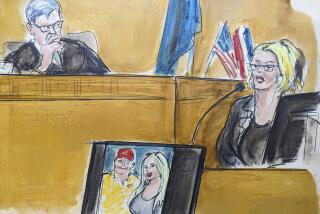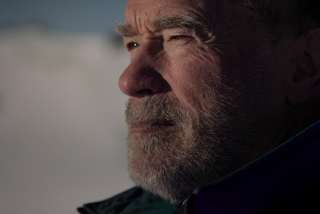Willey Details Charge of Clinton Sexual Advance
- Share via
WASHINGTON — Declaring softly that “it’s time for the truth to come out,” former White House volunteer Kathleen Willey accused President Clinton on Sunday of responding to her desperate plea for help by making a crude sexual advance just outside the Oval Office.
Willey, 51, said in a nationally televised interview that she could not believe the “recklessness” of the act. She claims Clinton hugged her tightly, kissed her on the mouth, fondled her breasts and placed her hand on his crotch.
Interviewed on CBS-TV’s “60 Minutes,” Willey said the encounter occurred Nov. 29, 1993, after she sought a meeting with Clinton, confided to him about her husband’s mounting financial difficulties and requested his help in obtaining a paying job.
Willey said she described the same events under oath last week to the federal grand jury investigating whether Clinton sought to cover up an alleged sexual relationship with a former White House intern, Monica S. Lewinsky.
Clinton has denied under oath that he engaged in any improper sexual activity with Willey or Lewinsky. His personal attorney, Robert S. Bennett, insisted Sunday that Willey’s televised account of the incident is false.
“The president of the United States adamantly denies the allegations that she has made,” said Bennett, who was interviewed separately by “60 Minutes.” “He is absolutely bewildered by them; he cannot understand why this is being said.”
In a sworn deposition in a civil suit alleging sexual harassment, which was brought by former Arkansas state employee Paula Corbin Jones, Clinton acknowledged embracing Willey and perhaps kissing her on the forehead. He said he has engaged in similar displays of affection with “scores and scores of men and women who have worked for me or been my friends over the years.”
Although Willey is not the first woman to accuse Clinton of misconduct, her account could prove particularly damaging because of the circumstances involved. Originally a staunch supporter of the president, Willey is perceived as a reluctant witness who sought Clinton’s help at a time of severe personal crisis.
Willey’s husband, Ed, a lawyer and Clinton backer, committed suicide on the day of the encounter, although neither Willey nor Clinton knew that at the time.
“This is not just sexual harassment, if it’s true; it’s sexual assault,” said Patricia Ireland, president of the National Organization for Women, on CNN’s “Late Edition.” “That is a pretty serious charge if true, and it is a very big problem.”
Clinton’s defenders acknowledged Willey’s potential importance as the investigation of a sitting president continues to unfold, but they insisted that her account will be proved false.
“There is substantial material of what she has said which is under seal, which has not been released, which seriously undercuts her claims,” Bennett said in an appearance on ABC-TV’s “This Week With Sam and Cokie.”
Willey appeared tense but resolute in her “60 Minutes” interview with Ed Bradley. She spoke slowly and softly and paused frequently as she offered her account of the events of more than four years ago.
She said she “had no problem” at first when Clinton reacted to her plea for help by giving her “a big hug” in a corridor after the two had left the Oval Office briefly to get a cup of coffee. “Every time I saw him, he would hug me.”
But then, she said, Clinton kissed her and pulled her closer. Willey said she tried to push herself away from him and remembered thinking, “What in the world is he doing?”
Noting that Clinton is “a big man” and “had his arms . . . tight around me,” she said he began fondling her breasts and whispered in her ear that “I’ve wanted to do this ever since I laid eyes on you.”
She said she asked whether he was afraid that “somebody’s going to walk in here,” and Clinton responded, “No.”
Then, she said, he “took my hand and he--and he put it on him. And that’s when I pushed away from him and decided it was time to get out of there. . . .
“I thought, well maybe I ought to just give him a good slap across the face. And then I thought, well, I don’t think you can slap the president of the United States like that.”
Willey said she has asked herself many times since the incident whether she was in some way responsible for what occurred.
“I think that your natural instinct is to wonder, ‘Did I bring this on? Did I send a signal, the wrong signal?’ ”
But she concluded otherwise. “The only signals that I was sending that day was that I was very upset, very distraught, and I needed to help my husband.”
Clinton also had approached her before, Willey said.
In 1992, when then-Arkansas Gov. Clinton was campaigning for the presidency in Richmond, Va., she said he saw her at the airport.
She said that Clinton sent someone over to get her telephone number and then he called her at home from Williamsburg, Va., saying he was worried about losing his voice on the eve of a debate. Willey said she reacted jokingly, “It sounds like you need some chicken soup,” and he responded by asking if she would bring him some, adding that he would try to get rid of the Secret Service agents protecting him.
Willey said she declined to go, “because my instincts told me he wasn’t interested in chicken soup.”
Adding to the seriousness of her charges, Willey said Bennett had “pressured” her. In addition, she said a major Democratic contributor, Washington-area developer Nathan Landow, had discussed the Oval Office incident with her. Both men dispute those claims.
While waiting for a court hearing in which Willey was ordered to give testimony in Jones’ civil suit against Clinton, she said Bennett told her the president thought the world of her and that what took place was not sexual harassment. Willey says that, when she did not reply, Bennett said: “It wasn’t unwelcome, was it?”
“It was unwelcome and unexpected,” Willey said she told Bennett. She said he then suggested she retain a criminal lawyer.
Asked why she had waited so long to speak publicly about the 1993 incident, Willey responded: “I just think that it’s time to tell this story. I think that . . . too many lies are being told. Too many lives are being ruined. And I think it’s time for the truth to come out.”
More to Read
Sign up for Essential California
The most important California stories and recommendations in your inbox every morning.
You may occasionally receive promotional content from the Los Angeles Times.













